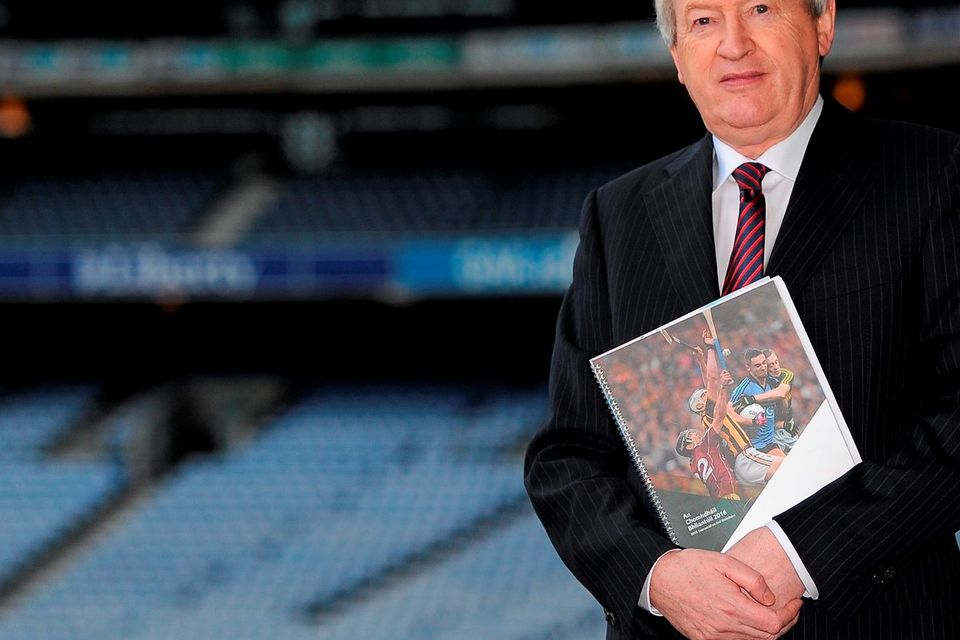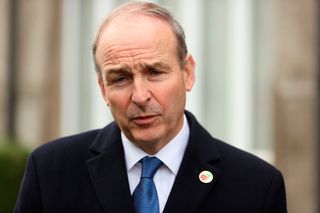'GPA plan for fixture change got a fair hearing' - Paraic Duffy
Director-general Duffy insists there is something wrong if GAA and players' body can't have difference of opinion
Paraic Duffy at Croke Park yestersday after releasing his annual report. Picture credit: Seb Daly / Sportsfile
The Gaelic Players Association were given a "very fair hearing" by the GAA in relation to their proposals for Championship reform, director general Paraic Duffy stressed at the launch of his annual report to Congress in Croke Park.
As the players' body seek direction from its membership over the failure of their plan to 'make the cut' for last week's Central Council meeting that considered three proposals and eventually settled on supporting a Congress motion for the introduction of an eight-team 'B' Championship, Duffy set out the case as to why the GPA proposal wasn't put forward for potential approval.
Echoing the Central Competitions Control Committee overview of the players' document, Duffy said there were too many games (61 up to 116), the potential for too many one-sided matches in round-robin groups where Division 1 teams played Division 4 and that historically round-robin games did not "excite" GAA spectators.
He added that the absence of reward for winning a provincial title - the GPA proposed seeding qualifier groups on League status - was also a downfall as it would potentially "downgrade" provincial championships.
Criticism
"I'm making those points because some of the criticism we've got in the last few weeks in relation to this is that the GPA did not get a fair hearing. It got a really fair hearing," he stressed.
Duffy outlined that when Central Council considered the 18 submissions at their November meeting three broad principles were established: that the provincial championship would be retained, that no new structure could impact adversely on club fixtures, and that a second-tier championship should be looked at.
CCCC was asked at that meeting to condense the 18 proposals with those principles in mind and, after four meetings, pared them down to three from which the GPA was excluded.
"They (CCCC) did that and they ruled out the GPA proposal. They spelled out the reasons why. They provided reasons for it out of respect to the players and out of respect to the players' body that, while it wasn't one of the three that was going forward, they felt that they should put forward the reasons why and I think it's important," said Duffy.
"It did not fit with the three principles that had been established at the meeting on the November 18.
"The first thing was it would double the number of Championship games, almost. Clearly you cannot have a principle that says we want to protect the club game and then turn around and recommend a proposal that increases the number of Championship games."
When asked if the GPA proposal could have been left standing Duffy said there was an obligation "not to mislead people".
"The GPA motion would not have passed at Congress," he predicted. "It didn't pass at Central Council. It wouldn't have passed; there's no point pretending otherwise."
He said a rejection of their proposals should not be taken as evidence of a rift. "We welcome their proposal but I have to make the point as well, this is an organisation of 750,000 members.
"We have clubs, we have all kinds of units. The GPA is one of those units and we welcome the fact they made a proposal. But just because it came from the GPA doesn't mean that we should have accepted it.
"It didn't meet the criteria, and I've given the reasons why. If we can't have a discussion with the GPA and disagree, there's something wrong. We have a different view than they have. Not Aogán (O Fearghail) and I - Central Council. And I've explained the reasons why. And those three things were all contrary to what Central Council decided should be the core of any Championship structure.
"But there's no question of any row between ourselves and the GPA; it's a difference of opinion. They want more games. I suppose our view would be we want more club games and we want less training."
Duffy also defended the 'B' Championship proposal heading for Congress.
"I accept that the GPA are saying it would appear a lot of players don't like that - but they've got to ask themselves is that better than where they are at the moment? That's a decision for the counties to make, and if Congress decides 'No, it's not better; we want to stick with what we have; we want the same chance as everybody in the qualifier', that's absolutely fine."
The director general drew comparison with inter-county hurling, which is tiered to reflect different standards, and also club structures which range from senior to lower junior grades, and asked if a player to which this competition was potentially applicable, might be better off.
"I go back to the hurling example again - the Christy Ring Cup gives the opportunity for you to win your way into the qualifier the following year.
"If people took a calm look at this and said 'if I'm a player in Division 4, this gives me an opportunity to play in a B Championship, the final will be played in Croke Park before a big game, probably I'd imagine an All-Ireland semi-final. It will almost certainly be televised live and the winners of the competition earn their way into the qualifiers the following year. I think there's a lot to be recommended in that."
Duffy said the process to find consensus is difficult. "Everybody can tell you what's wrong with the Championship, they can tell you that this is no good for the weaker counties.
"But there's very, very few ideas; very few solutions. And there's no solution - one size fits (all). There's no great proposal out there; or if there is, we didn't get it."
He also pointed out that there was a question of "fairness" about allowing 'B' Championship winners into a last qualifier round as a reward, given the comparative ease of passage they would have.
Director-general's report in brief
On Inter-provincial series
"Maybe now is the time to accept the inevitable: our crowded playing calendar and a lack of interest among players and the public tell us the competitions have no viable future."
On Galway and Mayo player heaves against management
"The wider effect is to diminish trust between county administrators and the GPA, creating an atmosphere in which many people are quick to attribute all blame, unfairly, to the GPA.
On the importance of third-level GAA
"Third-level colleges should not have to defend their efforts to promote their games against those whose concern does not extend beyond the requirement of the inter-county game."
Anti-doping
"Blood testing is a necessary component in the endeavour to maintain the integrity of our games, which must take precedence over all other considerations."
Grounds infrastructure
"It is becoming a problem that we can no longer evade."
The future
"(We) need to act now in a way that to rebalance our priorities in a way that our attentions are devoted more to our clubs and less to inter-county activities. The means to resolve the problems that we ourselves have created are available. Neglect them (clubs) and we lose touch with the heart and soul of the GAA. Guided by their spirit we will not go far wrong."















